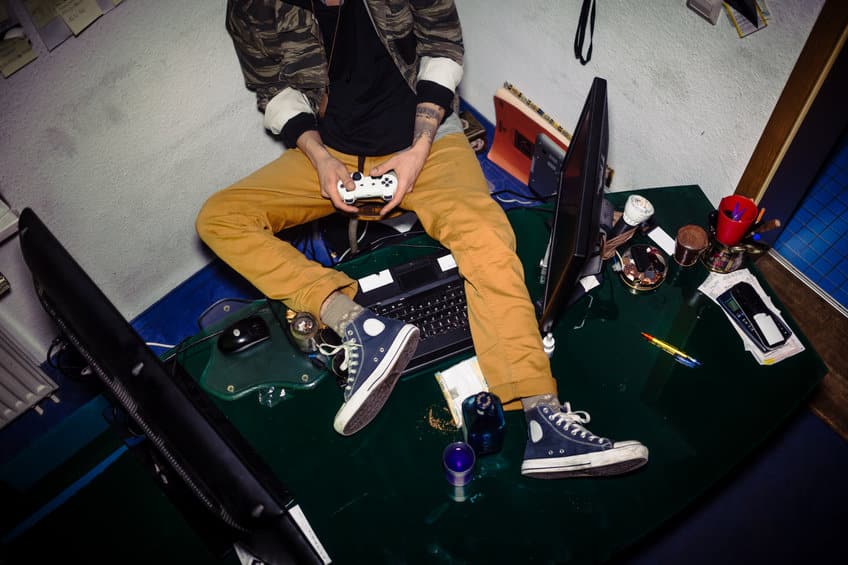Gaming disorder has now been given its own definition in the latest iteration of the World Health Organisation‘s International Classification of Diseases (ICD).
The ICD-11, which became effective this month (January 2022), highlights three characterisitics of this newly defined disorder:
- impaired control over gaming,
- increasing priority given to gaming over other activities to the extent that gaming takes precedence over other interests and daily activities, and
- continuation or escalation of gaming despite the occurrence of negative consequences.
This article is my reaction to this news:
What is the definition of gaming addiction?
To watch the full 15m video, on YouTube go to: https://youtu.be/55vxj64S0yg
I’m really pleased that the ICD-11 has included, categorically, without a doubt, that there’s a gaming addiction pandemic in the world. Our children are not being taken care of. They’re being babysat by gaming stations. Not just children but adults too.
I’ve seen come through my doors, more and more in the last ten years, emaciated, ill, unsocialised, undernourished, depressed, scared people, where they are addicted to the nature of games. It’s about time somebody said this isn’t healthy and put it on record that it isn’t healthy. Where a human repeats an action for 10, 15, 20 hours a day, becomes sleep deprived and does not function very well in other aspects of life it’s plain wrong.
The problem with it that I have is that the gaming industry design their games in order to addict people. It’s the repetition and occasional reward that addicts people. It’s the same as a slot machine or blackjack at a casino: ‘try, try, try, boom – reward, try, try, try, boom – reward.’ And that reward releases endorphins in the brain. These endorphins make us feel really good. This amazing feeling is what people are getting addicted to. It has to stop. The only way we can stop it is if we make sure people understand the dangers and we put a time limit on machines.
It is child abuse to have your child stuck on a gaming machine and not socialise, not eat at the family table, not eat well enough, not go out and get some fresh air. This is not an old man talking about what I believe a child needs. It’s wellbeing. It’s health. It needs to change.
Can the gaming industry help?
Microsoft has just cemented a $69 billion deal making them one of the front runners in the world on gaming. I believe Microsoft could lead by example and include health warnings and maybe a way that people can time how long the game’s being played. Of course, we already have that ability in our homes with most internet services. We can put on a time limit for certain users. We can actually leave the internet on but take users off. However, kids and adults, if they’re addicted, it’s like any drug or alcohol addiction. They will find a way – by accessing a second device, finding out a password, joining as another user, etc. – to stay on there.
Microsoft could lead the world by having a cut-off to their games. However, would that then damage that $69 billion price tag. My question is: what is a life worth? We know when we get puppies, they have to be socialised, become reasonable, well-adjusted and complementary dogs. It’s the same with children.
Adults: if you get addicted, you have to go and seek help. Any therapist with addiction training can help you. With children, it’s different. Children live in a very small world controlled by their parents and the context of their environment, the neighbourhood they live in. It needs to be governed by the parents; parents need to be responsible.
The other problem developing from gaming, of course, is exposure to paedophiles. Sexual predators are grooming their ‘friends’ on these games, pretending they’re a fellow eight, 11 or 16 year-old and suggesting they should meet or exchange photographs. It’s dangerous. We wouldn’t let our kids run in the streets with unknown people when we were younger. Everyone knew who everyone was. If there was a stranger on the block, we’d know about it. Why has it changed because of this digital world we live in.
Unfortunately, and I’m going to be honest here, a lot of the CEOs in the world, including the CEOs for digital companies, lack empathy. This is a known fact. There’s a huge body of work about how people that head up organisations are less empathic and may have issues themselves. Therefore, they look at the price tag and the success of the business over everything else. That needs to change. There needs to be some kind of safeguarding risk analysis to make sure that corporates are taking care of us, the people buying their products.
Is there a link between video games and depression?
What comes first, the chicken or the egg? Video games give children a nice high occasionally because there’s a random reward system. Again, a random reward system is the same as a slot machine. It makes us feel high. So, do more depressed, antisocial and bullied children find an identity in gaming, where they don’t have to be themselves? They can be the person who’s good at a game rather than socially interacting, and having the usual type of development with the peaks and troughs, highs and lows?
Gaming does cause depression. It causes sleep deprivation. It causes malnutrition. And malnutrition doesn’t mean to say you’re starving to death. It means you’re not getting the right nutrients, especially Vitamin D from being outside. Vitamin D is a known component that helps with the immune system, with strengthening bones and also alleviating depressive symptoms.
Being curled up in a darkened room with a screen in front of you also causes musculoskeletal issues. Being hunched over in a chair at a game for 18 hours is NOT good for the body. Not exercising the mind and muscle groups in any other way apart from chasing random rewards and thumbs pressing buttons is not healthy for a child.
You, the parents and you, the adults who are equally as addicted, need to change. If you can’t change yourself, seek professional help!
Can diagnosis tools and games about a mental illness be helpful in tackling gaming disorder?
Online diagnostic tools and games would be created based on generalisations about a mental health issue or people. And as we know, every human being in this world is unique.
Raising awareness about mental health is important, but who’s designing these games? Who’s having input as to what the game is designeds to do? I know that in scientific research, which I have been part of for many years, we have to be very careful about how we deliver information and how we manage the person after that information has been delivered. That’s why books such as the DSM-5 and ICD-11 are really for professionals. Because if a layperson reads them, they are likely to start saying they’ve got this, that or the other.
Self-diagnosis with a mental health game? I’m not sure whether a machine can take the place of a highly skilled professional who can read a person and be intuitive about their needs and how they got to this place. So, I would say online diagnotic tools and online games may be useful tools but only under supervision.
Where can someone access gaming disorder treatment?
The NHS in London are leading the field in public services for people with gaming disorder in the public health system. They’ve now got a specialist unit for gaming disorder. However, an addiction process is a cycle of change. We have to understand why someone’s become addicted to whatever it is they’re addicted to. Usually addiction is a sign of anxiety, depression, not coping in the world or falling into a trap of repetitive behaviour. Something controls them and causes dysfunction in everyday life.
Any therapist, such as myself, who’s trained in addiction models – and it’s part of all of our basic training – can work on the cycle of change with addictions. So, you don’t need a specialist gaming centre. The National Centre for Gaming Disorders in London is probably doing a lot of research as to what are the unique elements of gaming disorder beyond that of eating disorders – yes, eating disorders are an addiction – alcohol abuse, substance abuse, etc.
What it may be an idea for people to do is to understand what an addiction is. An addiction is something that becomes a priority in someone’s life and makes that person dysfunctional in their health, socialisation, education, work and sustainability. So, if you are experiencing this and you’re reading this, it may be an idea to think, ‘Why should I change? What would help me if I stopped (gaming, drinking, etc.)? How would I benefit if I could change my life? Why am I even thinking about changing my life? And if you are at that stage, you can reach out to any addiction service in your local area. Most of them are free in the Western world.
If you Google ‘Gaming Disorder’ or look at charitable organisations and non-profits, you’ll find there are heaps of them around the world. Access them, because you will find trained, understanding people. It feels very lonely when we’re addicted. You can reach out anonymously at first if you wish, just to get information. You will be very surprised and relieved that there are these people that understand exactly what you’re feeling and where you are.
And they will work with you, not put on you why you should change, but find out what your specific needs are, what’s happening in your world and how you got there in the first place, because that’s where the answers are.
So, if you are experiencing gaming disorder, if your children have any kind of addiction, or you as an adult feel that you’re not in control of ‘this’ any more, whatever it is, then Google the cycle of change and also Google, ‘Where can I get help?’ – free help or private help.
And good luck. If you’re reading this and you’re thinking, ‘Do you know what? That sounds a little bit like me,’ then I wish you all the best.
Out March 2022: Raw Facts for Real Parents
If any of this is making sense to you, and you are a parent of young children or an adult child, and you’re noticing some difficulties or you’re not sure how to manage an addictive habit, or a personality issue or anything else that goes with the parenting territory, my new book, Raw Facts From Real Parents: How To Parent Children, Teens and Adults in the 21st Century has some very useful keys to how you may be able to better manage it for yourself and your loved ones. If there is an addiction issue, Glenn Close appeared in a movie, Four Good Days. Watch it! You’ll learn a lot. The movie’s a fantastic resource for anyone experiencing problems with addiction within a family. Because it tears your family apart and it tears us apart inside.

Main image copyright: kzenon
